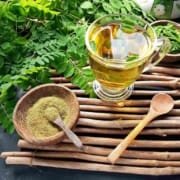Ginger: Health Benefits, Uses and Side Effects
Ginger, a common ingredient in kitchens worldwide, has been used for centuries in both cooking and traditional medicine. This aromatic root is known for its distinctive flavor and numerous health benefits. In this article, we’ll explore the uses of ginger, its potential health benefits, nutritional profile, and any associated risks.
What is Ginger?
Ginger, scientifically known as Zingiber officinale, is a flowering plant related to cardamom and turmeric. The part we commonly use is the rhizome, or underground stem, from which the roots grow. Ginger’s spicy aroma comes from compounds called gingerols, which are the focus of much health research.
A Brief History of Ginger
The word “ginger” has evolved over time, originating from the Sanskrit term “srngaveram,” meaning “horn root” due to its shape. For over 5,000 years, ginger has been cultivated in India and China as a tonic for various ailments.
Ginger was a prized commodity in ancient times. It was exported from India to the Roman Empire over 2,000 years ago and remained valuable even after Rome’s fall. During the Middle Ages, ginger was so precious that a pound of it was worth as much as a sheep!
By medieval times, preserved ginger was used in sweets, and Queen Elizabeth I of England popularized gingerbread men, turning them into a beloved Christmas treat.
Nutritional Profile of Ginger
Ginger is renowned for its antioxidant content, but it is not a significant source of vitamins or minerals. According to the U.S. Department of Agriculture, two teaspoons of ginger contain only 4 calories. Despite its low caloric value, ginger packs a punch with its potent bioactive compounds, including gingerol, shogaol, and zingerone, which contribute to its health benefits.
Potential Benefits of Ginger
Ginger has been the subject of numerous studies exploring its potential health benefits. Below are some of the most notable findings:
1. Digestive Health
Ginger is well-known for its digestive benefits. Research indicates that ginger can help alleviate gastrointestinal discomfort, including gas and bloating. A 2018 review of studies found that ginger’s enzymes assist in breaking down intestinal gas and expelling it from the body, providing relief from discomfort. Additionally, ginger may aid in improving gastrointestinal motility, potentially reducing the risk of constipation. It also supports the enzyme pancreatic lipase, which is crucial for digestion in the small intestine.
2. Nausea Relief
One of ginger’s most celebrated uses is its ability to relieve nausea. A 2020 review highlighted ginger’s effectiveness in reducing nausea associated with morning sickness and chemotherapy. The active compounds in ginger, gingerols and shogaols, are particularly effective in combating nausea. For instance, a study with cancer patients found that doses of 0.5 grams to 1 gram of ginger were most effective at reducing nausea.
3. Immune System Support
While anecdotal evidence supports ginger’s use in boosting the immune system, scientific studies are less conclusive. An older study from 2013 suggested that fresh ginger might offer respiratory protection, but dried ginger did not show the same benefits. A 2017 cross-sectional study found that daily ginger consumption might support immune function and protect against chronic diseases, including the common cold and flu.
4. Anti-Inflammatory Properties
Ginger has demonstrated potential anti-inflammatory effects, which can be beneficial for conditions like osteoarthritis. A 2015 review concluded that oral ginger supplementation could be moderately effective and safe for treating osteoarthritis-related inflammation. Additionally, a 2017 review of clinical trials highlighted ginger’s phytochemical properties that may combat inflammation.
5. Pain Relief
Ginger’s anti-inflammatory and analgesic properties may contribute to pain relief. A 2016 review found that ginger could help reduce dysmenorrhea, or menstrual pain. Despite the promising findings, the studies reviewed were often small or of limited quality, indicating the need for more robust research in this area.
6. Cardiovascular Health
There is some evidence suggesting that ginger may support cardiovascular health. A 2017 study involving over 4,600 participants found that daily ginger consumption might protect against various cardiovascular conditions, including coronary heart disease, high blood pressure, and diabetes. Additionally, a 2016 study on rats with diabetes indicated that ginger extract might reduce heart abnormalities, possibly due to its antioxidant properties.
7. Cancer Prevention
Ginger’s antioxidant content may play a role in reducing cancer risk. Antioxidants help combat oxidative stress caused by free radicals, which can damage cells and lead to various health issues, including cancer. A 2015 review suggested that ginger might be effective against certain types of cancer, including colorectal, gastric, pancreatic, and liver cancers. The review concluded that ginger might inhibit cancer cell growth or contribute to cancer cell death.
Benefits of Ginger Tea
Ginger tea is a delightful choice, especially during the colder months or after a meal. It’s easy to enhance its flavor with a splash of lemon or lime and a touch of honey.
Commercial ginger tea bags, which contain dried ginger often blended with other ingredients, are widely available and convenient. They store well and are simple to brew. While dried ginger provides many health benefits, fresh ginger delivers a more robust flavor and can offer similar health advantages.
How to Make Ginger Tea
Making ginger tea at home is straightforward:
- Obtain Fresh Ginger: Purchase a piece of fresh ginger root.
- Prepare the Ginger: Trim off any tough knots and dry ends. Peel the ginger carefully.
- Slice the Ginger: Cut the ginger into thin, crosswise slices.
- Brew the Tea: Place a few slices in a cup or mug. Pour in boiling water and cover. Let the slices steep for at least 10 minutes to extract the full flavor and benefits.
Ginger tea is a healthier alternative to ginger ale, ginger beer, and other commercial ginger beverages, which often contain high amounts of sugar. For a better option, consider sugar-free versions or limit sugary drinks to occasional treats.
Fresh Ginger vs. Ginger Powder
Both fresh ginger and ginger powder offer the health benefits of ginger, though they differ in flavor and convenience. Fresh ginger, with its intense flavor, needs to be peeled and chopped but can be stored in the refrigerator or frozen for future use. Ginger powder is easy to store, has a long shelf life, and is ready to use without any preparation.
Ginger paste is another convenient option, staying fresh for about two months when properly stored in the refrigerator or freezer.
Should You Take a Ginger Supplement?
Ginger supplements are not essential for gaining ginger’s health benefits. Experts advise incorporating ginger into your diet through food and beverages rather than taking pills, which may contain undisclosed ingredients. The supplement industry is not well-regulated, and the quality and quantity of ingredients can vary. The Food and Drug Administration (FDA) reviews only adverse reports on supplements, so it’s crucial to choose products that have been tested by independent third parties.
How to Incorporate Ginger into Your Diet
In addition to tea, ginger can be enjoyed in various forms:
- Fresh Ginger: Use freshly grated or minced ginger root in recipes.
- Ginger Paste: A versatile ingredient for many dishes.
- Ginger Powder: Adds flavor to both sweet and savory dishes, such as lentils.
- Ginger Oil: For aromatherapy or topical application
- Ginger Juice: Often used in wellness shots or smoothies
Pickled ginger, often served with sushi, offers a sweet-tart-spicy flavor along with the health benefits of ginger and the probiotic benefits of pickles. It is also lower in sodium compared to other pickled items.
Recommended Dosage and Safety
Ginger is generally safe when consumed in moderate amounts as part of a diet. The Food and Drug Administration (FDA) considers ginger root to be safe with a recommended daily intake of up to 4 grams. Most studies have used doses ranging from 250 milligrams to 1 gram, taken one to four times daily.
Risks and Considerations
While ginger is safe for most people, it’s essential to be aware of potential risks. The FDA does not regulate ginger supplements as strictly as medications, so quality and potency can vary between products. Some individuals may experience side effects such as heartburn, digestive issues, or allergic reactions. Additionally, ginger can interact with certain medications, such as blood thinners, so it’s crucial to consult with a healthcare professional before adding significant amounts of ginger to your diet or starting a supplement regimen.
Is Ginger Safe to Take During Pregnancy?
Research has confirmed that ginger is generally safe for managing nausea during pregnancy. It does not seem to increase the risk of miscarriage or exacerbate symptoms like heartburn or fatigue.
For safety, it is recommended to limit ginger intake to less than 1,500 mg of extract per day. Ginger can also be consumed in other forms, such as tea or chewy and hard candies.
Conclusion
Ginger is a versatile spice with a range of potential health benefits, from digestive support to anti-inflammatory effects. While existing research supports several of these benefits, more extensive and high-quality studies are needed to confirm ginger’s effectiveness and safety for various health conditions. Whether you incorporate ginger into your cooking, enjoy it as a tea, or consider supplements, it’s always wise to consult with a healthcare provider to ensure it’s a suitable addition to your health routine.









